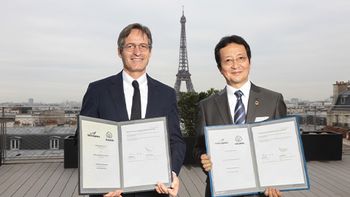
- Pharmaceutical Commerce - September 2009
American Airlines Cargo Bids for Cold Chain Business
Global carrier is working with Envirotainer to expand service capabilities
The market for long-distance cold-chain services is getting more competitive as American Airlines Cargo (Dallas) upgrades its cargo services to include the accreditation as a Qualified Envirotainer Provider (QEP) by Envirotainer (Lagga Marma, Sweden), a leading provider of air-freight-ready containers. The accreditation specifies that AA Cargo has the facilities and trained staff to manage the transfer, storage and delivery of Envirotainer containers, specifically its LD3, LD9 (narrow-body jets) and CLD (narrow or wide-body) units, which cover a temperature range of -20 to +20°C (-4 to 68°F). In shipment, these units need monitoring of their supply of coolant or battery recharging, and that correct procedures are maintained when the units are being transferred.
For AA Cargo, the accreditation is an important signal in its bid to grow its cold-chain business. “We’ve been handling insulated, temperature-controlled packaged all along,” says Joe Reedy, VP of sales and marketing, “but over the past year we ran a 10-city pilot for our new ExpediteTC service in conjunction with Envirotainer. The positive results from that pilot have enabled us to expand this service worldwide.”
Initially, this service will be available in 60 cities in AA Cargo’s network, and then will be expanded to more of the 250 cities and 40 countries that it operates in. AA Cargo has a fleet of over 900 aircraft making 3,400 flights daily.
ExpediteTC is the equivalent of AA Cargo’s Expeditefs service, but tailored specifically to cold-chain shipping, says Reedy. It will provide dedicated resources to ensure that pharma shipments not only arrive as they were scheduled to, but are monitored and trackable at each transfer point. AA Cargo provides a “flown as booked” guarantee, which specifies that the shipment will occur precisely on the flight that was reserved for it.
IATA rules
Reedy says that the company is also integrating the evolving standard of the International Air Transportation Assn. (IATA) for temperature-sensitive shipping into the ExpediteTC service. These include labeling on the shipping container specific to cold chain, along with standardized operating procedures. Some of these guidelines have gone into effect this past summer.
Another looming regulatory issue is the requirement, from the US Transportation Security Administration (TSA), for procedures for opening and inspecting shipments—something that could severely disrupt operations for sealed, temperature-sensitive shipments. TSA and the cargo industry have been working out procedures for managing this process.
Articles in this issue
about 16 years ago
Industry Feeds a Fever Over Cold Chain Regulationabout 16 years ago
Bristol-Myers Squibb, Roche Lead on Environmental Sustainability Scoringabout 16 years ago
Biopharma Needs to Adopt 'More Radical' Cost-Cutting, Says Capgeminiabout 16 years ago
GHX Electronic Trading Platform Gains More Healthcare Participationabout 16 years ago
Coupons, Vouchers and 'Loyalty' Cards Connect Drugmakers With Patientsabout 16 years ago
Market Researchers Offer Targeted but Economical Surveys, Fact-FindingNewsletter
Stay ahead in the life sciences industry with Pharmaceutical Commerce, the latest news, trends, and strategies in drug distribution, commercialization, and market access.




